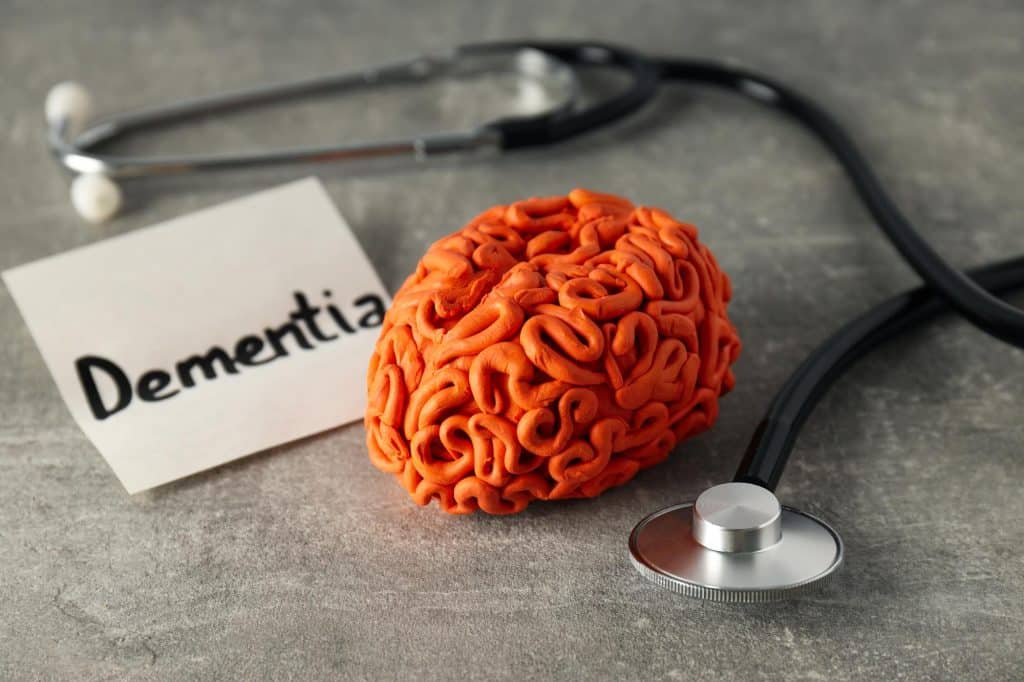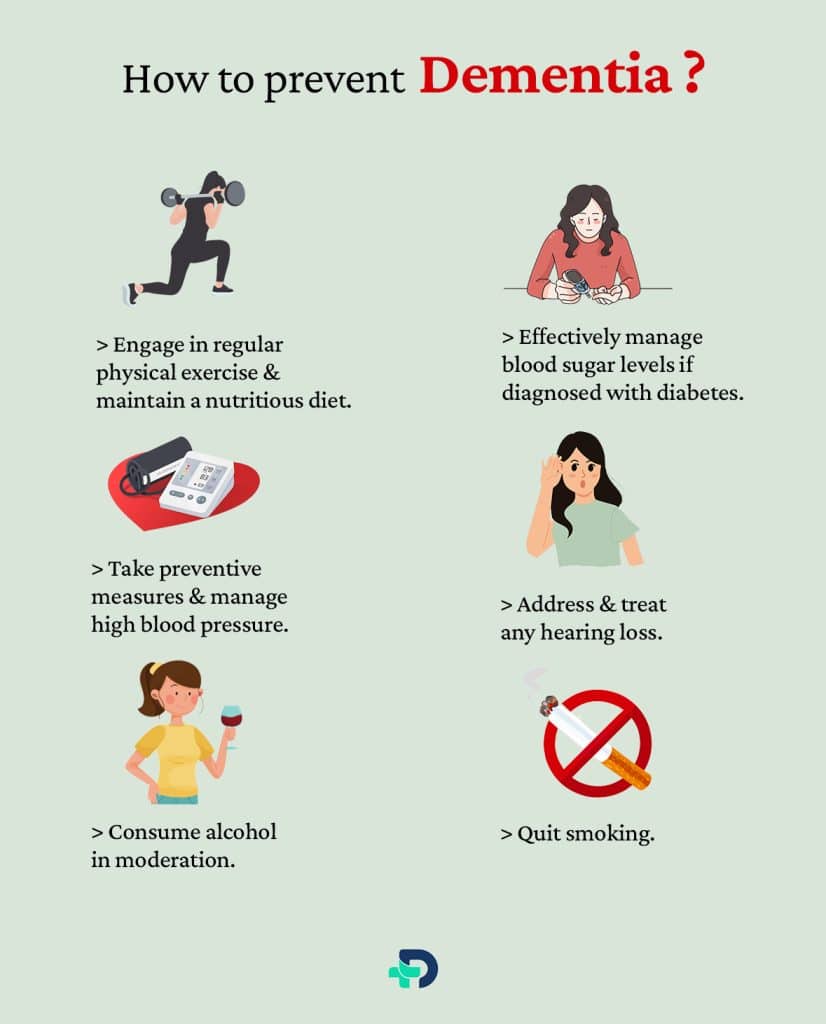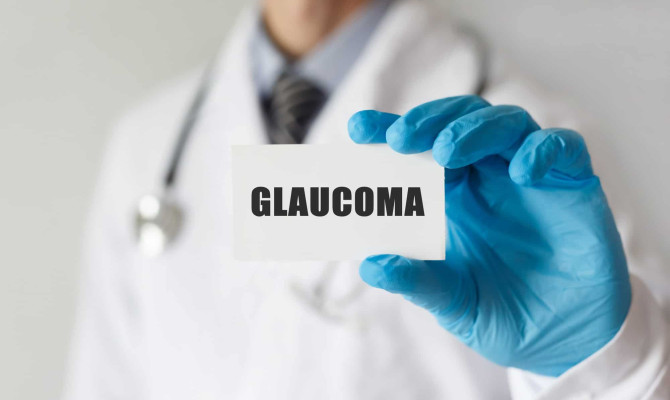Dementia : Types, Stages, and Treatment

- Dementia
- 16 Aug 2023
Overview
What is Dementia ?
Dementia is the depletion of cognitive functioning — contemplating, recollecting, and deducing — to such a degree that it hampers an individual’s day-to-day existence and undertakings. Certain individuals with dementia may be incapable of managing their emotions, and their characters may undergo alterations. Dementia varies in intensity from the least severe stage, when it is just initiating to impact an individual’s performance, to the most severe stage, when the individual must rely entirely on others for fundamental activities of regular living, such as nourishing oneself.1Overview| Researched based study from Nia.nih.gov

Types
Types of Dementia
Alzheimer’s Disease
- In Alzheimer’s disease, functioning of microtubules disrupted, which affects the neuron’s structural support and transportation system.
- Consequently, communication between nerve cells is impaired, potentially leading to their deterioration.
Huntington’s Disease
- Huntington’s disease is a neurological condition where specific regions of the brain experience the deterioration of neurons. This degeneration can result in emotional disruptions, cognitive decline, and involuntary movements.
Vascular Dementia
- Vascular dementia is caused by blood vessel-related brain damage, often from strokes, genetic disorders, an infection of heart valves, or accumulation of amyloid protein in brain blood vessels, potentially causing hemorrhagic or “bleeding” strokes.
Dementia with Lewy Bodies
- The brain’s outer layer, known as the cortex, and a specific region in the mid-brain called the substantia nigra experience cell death.
- In the substantia nigra, a significant number of the surviving nerve cells exhibit unusual formations called Lewy bodies, which are characteristic indicators of the condition.
Frontotemporal Dementia
- In Frontotemporal dementia (FTD) functioning of frontal and temporal lobes of the brain disrupted.
- Since these regions of the brain are responsible for regulating judgment and social behavior, individuals affected by FTD frequently experience difficulties in maintaining typical social interactions and adhering to societal norms.
Normal Pressure Hydrocephalus
- The ventricles in the brain normally hold cerebrospinal fluid, which is essential for normal brain function.
- Occasionally, an excess of fluid can accumulate in these chambers, resulting in a condition known as normal pressure hydrocephalus and results in to dementia.
Creutzfeldt-Jakob Disease (CJD)
- It is an uncommon, progressive, and ultimately deadly neurological disorder.
- The disease is caused by an abnormal variant of a protein known as a prion.
- In exceptional instances, CJD can also be acquired by coming into contact with infected brain or nervous system tissues, typically as a result of certain medical procedures.
Corticobasal Degeneration
- It is a gradually advancing condition characterized by the degeneration and shrinkage of nerve cells in various regions of the brain.
- Patients frequently exhibit abnormal build-ups of the protein tau in their brain cells.
Mild Cognitive Impairment
- It refers to cognitive symptoms that exceed what is typically observed for a person’s age, but do not significantly hinder their ability to carry out daily activities or maintain relationships.2Types| Researched based study from stanfordhealthcare.org
Symptoms
What are the signs and Symptoms of Dementia?
Common early signs of mild cognitive impairment
- Noticeable shifts in mood.
- Feeling disoriented or confused.
- Decline in work performance.
- Difficulty focusing, maintaining attention, or multitasking.
- Difficult to find the appropriate words or losing train of thought during conversations.3Symptoms| Researched based study from Nhs.uk
Symptoms distinctive to Alzheimer’s disease
- Progressive and persistent decline in memory.
- Difficulty in word retrieval.
- Challenges with numerical comprehension and managing financial transactions in retail settings.3Symptoms| Researched based study from Nhs.uk
- Increasing tendencies toward social withdrawal or heightened anxiety.
- Experiencing confusion or disorientation in unfamiliar settings.
- Engaging in repetitive questioning behavior.
Vascular dementia
- Experiencing difficulties with mobility or observing alterations in gait patterns.
- Experiencing challenges with attention, planning, and logical reasoning.
- Experiencing symptoms of depression and heightened emotional reactivity.3Symptoms| Researched based study from Nhs.uk
Dementia with Lewy bodies
- A gradual decline in physical movement.
- Recurrent episodes of falling and instances of fainting.
- Encountering difficulties with sleep.
- Periods of heightened alertness and drowsiness.3Symptoms| Researched based study from Nhs.uk
Frontotemporal dementia
- Reduced awareness of others’ emotions.
- Reduced ability to recognize social cues and norms.
- Experiencing difficulties with language.
- Developing preferences for uncommon or unconventional foods.
Symptoms in the advanced stages of dementia
- Frequent lapses in memory.
- Inability to communicate verbally.
- Challenges in physical movement
- Behavioral disturbances
- Loss of bladder control
- Challenges in the process of consuming food or liquids.3Symptoms| Researched based study from Nhs.uk
Stages
What are the different stages of Dementia?
Normal behavior
- During the initial stages of dementia, individuals may not exhibit any noticeable symptoms, despite underlying changes in the brain that may already be taking place.4Stages| Researched based study from Nhsinform.scot
Memory lapses
- Individuals may experience frequent forgetfulness and a tendency to misplace items regularly within their homes.
Subtle deterioration
- As dementia progresses, individuals may gradually experience subtle changes, such as frequently misplacing personal belongings, and struggling with remembering appointments, indicating that something is not quite right.
Moderate deterioration
- During the moderate decline stage of dementia, the signs and symptoms become more evident, with individuals experiencing challenges in managing finances, paying bills, and remembering simple details like their breakfast.
- Individuals may require increased assistance for daily activities, although they may still be able to manage certain personal needs independently, such as using the toilet, but might struggle with tasks like dressing appropriately or recalling basic personal information.
Severe deterioration
- In the advanced phases of dementia, ongoing monitoring becomes essential as individuals may need help with tasks like bathing and getting dressed. There might be noticeable alterations in personality and behavior.
Extremely severe deterioration
- Before reaching the advanced stage of dementia, many individuals may pass away due to unrelated health conditions, while in the final stage, they will face significant speech impairment, dependency on assistance for daily activities and feeding, and will necessitate full-time care and professional caregiver support.
Causes
How is Dementia caused?
Dementia occurs due to progressive alterations and harm to the brain. The alterations typically occur due to the accumulation of abnormal proteins in the brain. Each type of dementia is characterized by distinct abnormal proteins that contribute to the condition. In the majority of cases, dementia is not directly inherited from one’s family members.4Causes| Researched based study from Nhsinform.scot
Interrupted Blood supply
- Vascular dementia occurs as a result of disruptions in the brain’s blood supply.
Loss of brain cells
- In Alzheimer’s disease, the shrinking of the brain is caused by the progressive loss of brain cells (also called neurons). Over time, protein clumps called “plaques” and “tangles” develop in the brain, and these are believed to be responsible for the ongoing decline in brain cell function and number.
Lewy bodies
- Lewy bodies are proteinaceous deposits that form within brain cells and have a distinct round shape. They disrupt the normal functioning of two crucial messenger chemicals in the brain, namely dopamine and acetylcholine, which regulate recollection, acquiring knowledge, emotional state, and focus.4Causes| Researched based study from Nhsinform.scot
Deterioration of brain’s part
- Frontotemporal dementia is the result of atrophy and deterioration occurring in the temporal lobe and frontal lobe of the brain.
Genetics
- In approximately 20% of cases, individuals with frontotemporal dementia inherit a genetic mutation from their parents.4Causes| Researched based study from Nhsinform.scot
Motor neuron disease
- Motor neuron disease is occasionally linked to frontotemporal dementia. This rare condition gradually damages the nervous system, leading to progressive muscle wasting.
Less frequent causes
- Certain brain tumors.
- Prolonged excessive alcohol consumption.
- Head trauma.
- Insufficient dietary intake of vitamin B.
- Inadequate levels of thyroid hormone.
Rare causes
- Huntington’s disease – An uncommon genetic condition that leads to gradual degeneration of the brain.
- Corticobasal degeneration (CBD) – An uncommon disorder characterized by a progressive deterioration in motor skills, speech, cognitive abilities, and swallowing.
- Progressive supranuclear palsy (PSP) – An infrequent neurologic disorder that can result in difficulties related to balance, motor function, visual perception, and swallowing.4Causes| Researched based study from Nhsinform.scot
Prevalence
Prevalence of Dementia
- Dementia is diagnosed in one person every 3 seconds worldwide.
- In the year 2020, the global count of individuals living with dementia exceeded 55 million.
- This figure is projected to nearly double every two decades, reaching 78 million by 2030 and 139 million by 2050.
- The majority of this growth will occur in developing nations.
- Currently, 60% of people with dementia reside in low- and middle-income countries, but by 2050, this percentage is expected to rise to 71%.
- Dementia predominantly impacts older individuals; however, there is increasing recognition of cases that begin prior to the age of 65.5Prevalence| Researched based study from Alzint.org
Treatment
Treatment of Dementia
Dementia medication
- Acetylcholinesterase inhibitors work by inhibiting an enzyme responsible for the breakdown of acetylcholine, a substance crucial for facilitating communication between nerve cells in the brain.
- Memantine is an alternative treatment option for individuals who are unable to take or tolerate acetylcholinesterase inhibitors. It functions by blocking the effects of an excessive amount of glutamate, a chemical in the brain.
- In cases of persistent aggression or extreme distress, healthcare professionals may prescribe antipsychotic medications such as risperidone or haloperidol.6Treatment| Researched based study from Nhs.uk
Therapy and support
Cognitive stimulation therapy
- Cognitive stimulation therapy (CST) involves participating in group activities and exercises that aim to improve memory capacity, cognitive reasoning skills, and linguistic proficiency.6Treatment| Researched based study from Nhs.uk
Cognitive Rehabilitation
- Cognitive rehabilitation utilizes the functional areas of the brain to assist the impaired areas, involving collaboration between a trained professional, a family member, or a friend to achieve specific personal goals, such as mastering everyday tasks or using technology like a mobile phone.
Reminiscence
- Reminiscence work entails discussing past experiences and events, often utilizing visual aids like photos, cherished belongings, or music, while life story work involves creating a compilation of photographs, notes, and mementos spanning from childhood to the present, with both approaches demonstrating evidence of enhancing mood and overall well-being.6Treatment| Researched based study from Nhs.uk
Remedies
- Gingko biloba can offer potential benefits in managing dementia symptoms.
- A modest increase of just 25% in physical activity among older individuals could potentially prevent one million cases of Alzheimer’s disease on a global scale.
- Reducing daily stress levels.
- Obtaining sufficient and restful sleep is associated with a decreased risk of dementia.
- Coconut oil can enhance brain function and improve communication within the brain.
- Vitamin B-12 is known to play a role in maintaining cognitive function.
- Ashwagandha exhibits the ability to hinder the growth of beta-amyloid plaques.
- Supplementing with omega-3 fatty acids has shown the potential in slowing down the progression of Alzheimer’s disease.
Can dementia be cured?
- At present, there is no known “cure” for dementia.
- Due to the diverse range of diseases that can cause dementia, it is unlikely that a single cure for all forms of dementia will be discovered.
- However, ongoing research is focused on developing treatments for specific diseases that lead to dementia, such as Alzheimer’s disease, frontotemporal dementia, and dementia with Lewy bodies.7Treatment| Researched based study from Dementia.org.au
Risk
Who are at risk?
- The primary contributing factor to dementia is the process of aging, whereby an individual’s likelihood of developing dementia significantly rises as they grow older.
- Inherited genetic factors can influence an individual’s susceptibility to dementia, as certain genes can be passed down from parents and impact their likelihood of developing the condition.
- Cognitive reserve’ refers to an individual’s capacity to effectively manage brain diseases. It is developed by engaging in mentally stimulating activities throughout one’s life.
- Greater cognitive reserve results in a delayed onset of difficulties in performing everyday tasks caused by brain diseases.
- Among individuals aged 80 and above, women have a slightly elevated risk of developing dementia compared to men in the same age group.
- Research indicates that an individual’s risk of dementia may be higher if they experience an earlier onset of menopause, which leads to a decline in estrogen and progesterone levels.
- Individuals residing in deprived areas, characterized by limited access to essential resources and services like adequate housing, education, and employment opportunities, face an elevated risk of developing dementia.
- Engaging in regular mental, physical, and social activities, refraining from smoking, consuming alcohol in moderation, and maintaining a healthy diet are associated with a reduced likelihood of developing dementia.
- Individuals who have cardiovascular diseases, depression, or traumatic brain injuries face an increased risk of developing dementia.8Risk| Researched based study from Alzheimers.org.uk
Prevention

How to prevent Dementia?
- Engage in regular physical exercise and maintain a nutritious diet.
- Effectively manage blood sugar levels if diagnosed with diabetes.
- Take preventive measures and manage high blood pressure.
- Address and treat any hearing loss.
- Seek professional support when experiencing depression.
- Consume alcohol in moderation.
- Quit smoking.9Prevention| Researched based study from Cdc.gov
Prognosis
Prognosis of Dementia
- Dementia is a serious condition with a typically unfavorable outlook.
- Individuals with dementia are estimated to have at least twice the mortality risk compared to those without dementia.
- During the advanced stages of dementia, individuals often experience significant physical frailty, compromised immune function, prolonged periods of bed rest, and potential difficulties with swallowing.
- Individuals are susceptible to developing additional medical complications that can be life-threatening, including infections such as pneumonia and cardiovascular issues like blood clots affecting the brain or lungs.10Prognosis| Researched based study from Alzheimers.org.uk
- Regardless of the specific type of dementia, individuals with this condition generally have a reduced average life expectancy, which is why dementia is referred to as a condition that limits life span.
Any feedback on this article?
 This Articles content was accurate
This Articles content was accurate Very Informative Article
Very Informative Article I have a question or a comment
I have a question or a comment
 This article contains inaccurate content
This article contains inaccurate content This article was not helpful
This article was not helpful I have a question or a comment
I have a question or a comment
We appreciate your helpful feedback!
Checkout our social pages
References
-
National Institute on Aging
What Is Dementia? Symptoms, Types, and Diagnosis | Overview
-
Stanford Health Care
Types of Dementia | Types
-
National Health Service
Dementia guide | Symptoms
-
NHSInform
About Dementia | Causes
-
Alzheimer's Disease International
Dementia statistics | Prevalence
-
National Health Service
Dementia guide-What are the treatments for dementia? | Treatment
-
Dementia Australia
Dementia treatments and cure | Treatment
-
Alzheimer's Society
What can increase a person's risk of dementia? | Risk
-
Centers for Disease Control and Prevention
Dementia Risk Reduction | Prevention
-
Alzheimer's Society
The later stage of dementia | Prognosis





































